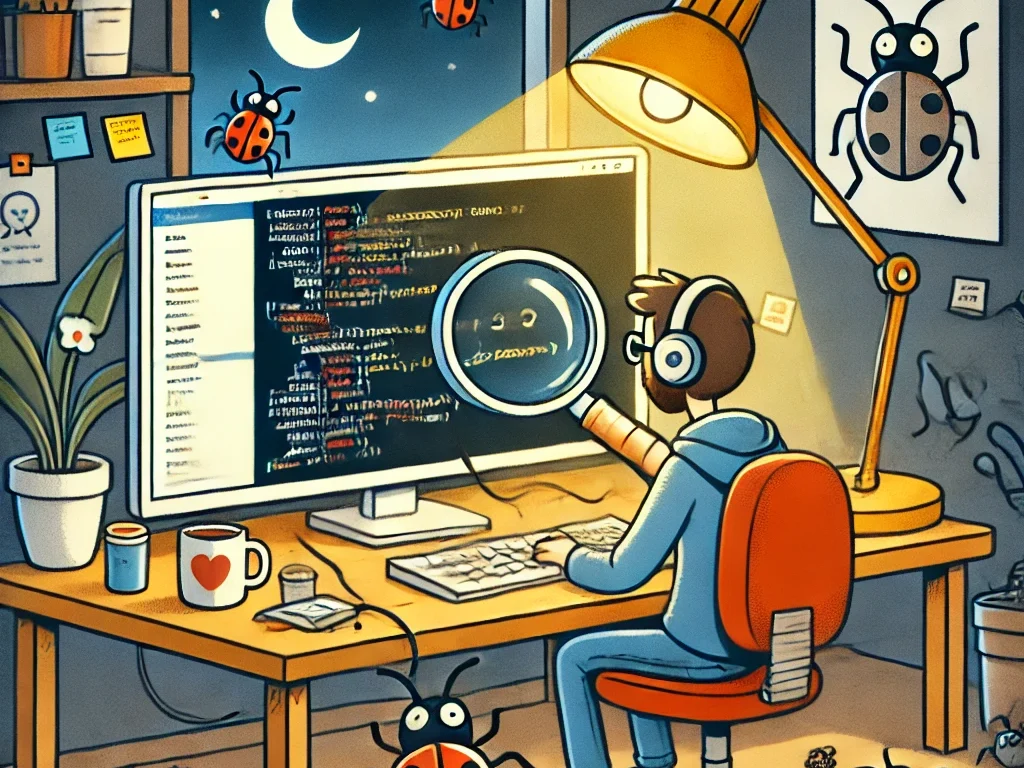Programming is often glorified as a world of creativity and innovation. But ask any developer, and they’ll tell you the truth: a significant portion of their time is spent debugging. Debugging isn’t just a technical skill—it’s an art form, a detective story, and sometimes, a practice in self-therapy. In this post, we’ll dive into the quirks of debugging, useful techniques, and the lessons we can learn from our programming mishaps.
Why Debugging Feels Like Detective Work
Imagine this: you’re working on a codebase, everything seems fine, and then—bam!—something breaks. A bug has entered the scene, and it’s your job to figure out who, what, and why.
Debugging is like being a detective in a noir film. You examine the “crime scene” (your code), gather evidence (logs, stack traces), interrogate witnesses (variables), and narrow down suspects (misbehaving functions). But just like in any great mystery, sometimes the answer surprises you.
The “It Works on My Machine” Mystery:
Every programmer has encountered this haunting bug. The code works perfectly on your machine but crashes everywhere else. The culprit? Often, it’s environment differences, missing dependencies, or configuration files you forgot to share. Lesson learned: Always suspect your own setup first!
Common Debugging Techniques That Work
1. Rubber Duck Debugging
This classic method involves explaining your code, line by line, to a rubber duck (or any inanimate object). It sounds silly, but articulating your thought process often reveals errors you couldn’t see before.
2. Print Statements vs. Breakpoints
Some prefer console.log() or print() statements scattered through their code like breadcrumbs. Others lean on breakpoints in their IDE. Both methods are valid, but breakpoints allow you to pause and inspect the state of your program without cluttering your code.
3. Binary Search Debugging
This method involves isolating the problem by testing halfway through your code and determining which half contains the issue. Repeat this process until you find the bug. It’s fast, logical, and incredibly satisfying.
4. Debugging Tools
Modern IDEs and tools are lifesavers. Here are a few examples:
- Browser Dev Tools for JavaScript
- Xdebug for PHP
- PyCharm Debugger for Python
- gdb for C/C++
Learn your debugger’s shortcuts and advanced features—it’s worth the time investment.
Debugging Horror Stories (and Lessons Learned)
The Vanishing Database:
A developer once ran a script to delete test data. But due to a poorly written condition, it wiped the entire production database. The lesson? Double-check any destructive operations, and always test on a staging environment first.
The “I Forgot to Save” Disaster:
After hours of tweaking code to fix a bug, a programmer runs the code—only to find the same error. The issue? They hadn’t saved the file. Lesson? Enable autosave or get into the habit of saving frequently.
The Infinite Loop Nightmare:
One infamous bug involved an infinite loop that generated thousands of logs per second, crashing the server. The culprit? A while(true) loop with no proper exit condition. Lesson: Always set safeguards for loops.
Debugging Tips for Sanity Preservation
1. Take Breaks
Sometimes, staring at the code only makes the problem harder to see. Step away, grab a coffee, or take a walk. Fresh eyes often find solutions faster.
2. Write Tests
Automated tests are your safety net. Bugs often lurk in untested areas, so covering your code with unit tests can save you a lot of pain.
3. Stay Curious
Treat bugs as opportunities to learn. Each bug you fix strengthens your understanding of the code and the system it runs on.
4. Ask for Help
If you’re stuck, ask a colleague or post on a forum like Stack Overflow. Sometimes, another perspective is all you need.
Why Debugging Makes You a Better Programmer
Debugging forces you to dig deep into your code and understand how it truly works. It sharpens your problem-solving skills, builds patience, and teaches you to anticipate future issues. Every bug you fix is a step toward becoming a more confident and skilled developer.
Debugging as an Art Form
Debugging isn’t just about fixing mistakes—it’s a journey of discovery. It’s about understanding your code, identifying flaws, and ultimately, growing as a programmer. Embrace debugging, and you’ll find that even the most frustrating moments can lead to the most rewarding breakthroughs.

